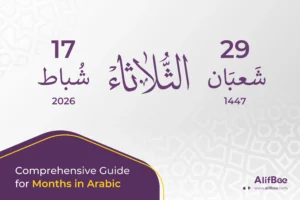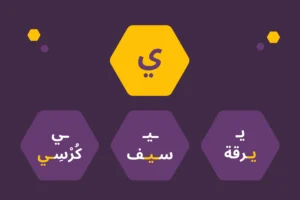Why Does Learning Arabic Seem Difficult?
Learning a new language can be a rewarding but challenging experience. Arabic, with its rich history and cultural significance, often seems particularly daunting to learners.
However, understanding the common challenges of learning Arabic and how to overcome them can make the journey much more manageable.
Let’s explore common challenges of learning Arabic and the solutions to tackle them effectively.
Arabic Script is unfamiliar
Challenge: The main challenge when learning Arabic is that the Arabic script is different from scripts of Latin-based languages, which can be intimidating for beginners.
Solution: Start with flashcards and writing practice. Apps like AlifBee are excellent tools for familiarizing yourself with the Arabic alphabet. Consistent practice will help you recognize and write the characters with ease.
Arabic pronunciation can be unusual
Challenge: Arabic pronunciation includes sounds that may not exist in your native language, making it tricky to master.
Solution: Immerse yourself in the language by listening to native speakers through podcasts, music, and videos. Mimic their pronunciation and use language exchange platforms to practice speaking with native speakers. This will help you get used to the sounds and improve your Arabic pronunciation over time.
Arabic Grammar is complex
Challenge: Arabic grammar can be complex, with different verb conjugations, sentence structures, and rules that may be unfamiliar.
Solution: Break down grammar rules into manageable chunks. Focus on mastering one aspect at a time, such as verb conjugations or sentence structure. Use structured lessons or tutoring to guide you through the intricacies of Arabic grammar.
Arabic has many dialects
Challenge: Arabic is spoken in many dialects, which can be confusing for learners.
Solution: Choose one dialect to start with, preferably Modern Standard Arabic (MSA), for its wide use in media and formal settings. Once you’re comfortable with MSA, you can learn a specific regional dialect based on your interests or needs.
Limited resources for learning Arabic
Challenge: Access to quality learning materials can sometimes be limited, especially in certain regions.
Solution: Utilize online resources such as free courses, YouTube channels, and language learning apps. Joining online communities and forums can provide additional support and materials to aid your learning process.
Learning Arabic requires self-reliance
Challenge: Learning Arabic often requires a high degree of self-discipline and motivation.
Solution: Set clear, achievable goals and create a consistent study schedule. Use planners or apps to track your progress and stay motivated. Having a structured plan will help you stay on track and maintain your motivation.
Easily Overwhelming
Challenge: The sheer amount of new information (Arabic grammar rules and Arabic words) can be overwhelming for learners.
Solution: Take regular breaks and avoid cramming. Focus on small, consistent efforts rather than trying to learn everything at once. Celebrate your milestones, no matter how small, to keep your spirits high and maintain a positive attitude towards learning.
Final word
While learning Arabic may seem challenging at first, breaking down the process into manageable steps can make it an achievable and rewarding experience.
By addressing each common hurdle—whether it’s the unfamiliar alphabet, tricky pronunciation, complex grammar, multiple dialects, limited resources, or the need for self-reliance—you can develop effective strategies to overcome them.
Remember to start with tools like flashcards and apps for the alphabet, immerse yourself in native speech for pronunciation, tackle grammar in small chunks, and choose a dialect that suits your goals.
You can also use online resources, set clear goals, and pace yourself to avoid feeling overwhelmed. Keep in mind that every milestone, no matter how small, is a step closer to fluency.
Read our blog 11 Unique Facts about Arabic that can give you valuable insights into the Arabic language and help you in the journey learning it.








